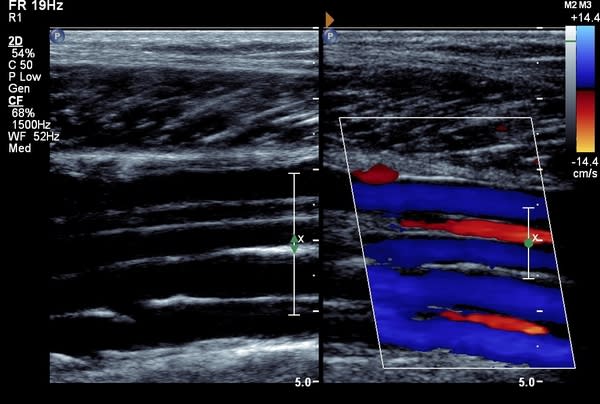Blog

Deep Vein Thrombosis (DVT) In Pregnancy
Sunday 12th March 2017
Deep vein thrombosis (DVT) is a serious condition where a blood clot develops, often in the deep veins of the legs but occasionally in the pelvis. It can be fatal if the clot dislodges and travels to the lungs.
Having a DVT is not common in pregnancy, but pregnant women are more likely to develop thrombosis than non-pregnant women of the same age. A clot can form at any stage of pregnancy and up to six weeks after the birth.
Other factors that put you at risk of thrombosis include:
- having had thrombosis (a clot) before
- being over 35
- having thrombophilia – a condition that makes clots more likely
- being obese – with a BMI of 30 or more
- carrying twins or more
- having a parent, brother or sister who has had a thrombosis
- having fertility treatment
- having just had a caesarean section
- not moving (being immobile) for long periods of time, including long-distance travel of more than four hours, or after an operation
- being a smoker – get support to stop smoking
- having severe varicose veins – if they are painful or above the knee with redness or swelling
- dehydration
What are the symptoms of DVT?
The symptoms of DVT usually, but not always, occur in one leg only. Seek advice from your midwife or doctor immediately if you notice one or more of the following symptoms in your leg:
- swelling
- pain
- warm skin
- tenderness
- redness, particularly at the back of the leg below the knee
During pregnancy it's common to experience swelling or discomfort in your legs, so this doesn't mean there's a serious problem. If you're worried, talk to your midwife or GP.
A pulmonary embolism (PE) is when a blood clot travels to the lungs. It can be fatal. Symptoms of PE include:
- sudden difficulty breathing
- chest pain or tightness
- collapse
Once a DVT is diagnosed and treatment is started, the risk of developing a PE is very small.
Managing DVT in pregnancy
Injections with low molecular weight heparin (LMWH) are usually used to treat pregnant women with DVT. LMWH is an anticoagulant, which means it prevents the blood clot getting bigger. It does not affect your developing baby.
Heparin prevents the clot getting bigger so your body can dissolve it. The injections also reduce the risk of a PE and the risk of developing another clot in your leg.
Treatment usually lasts for the rest of your pregnancy and until at least six weeks after the birth. If necessary, it may continue for longer to complete a minimum of three months' total treatment time.
Although medical treatment for DVT is essential, there are things you can do to help yourself, including:
staying as active as you can – your midwife or doctor can advise you on this
wearing a prescribed compression stocking to help the circulation in your leg
Travel
To reduce the risk of DVT while you're travelling:
- drink plenty of water
- don't drink alcohol, as it can lead to dehydration – women are advised to avoid drinking in pregnancy
- perform simple leg exercises, such as regularly flexing your ankles – if you're on a flight, most airlines provide information on suitable exercises to do during your flight
- if possible, get off the bus, car or plane during refuelling stops and walk about
Numi Scan offer a same day service to diagnose leg DVT for £120





